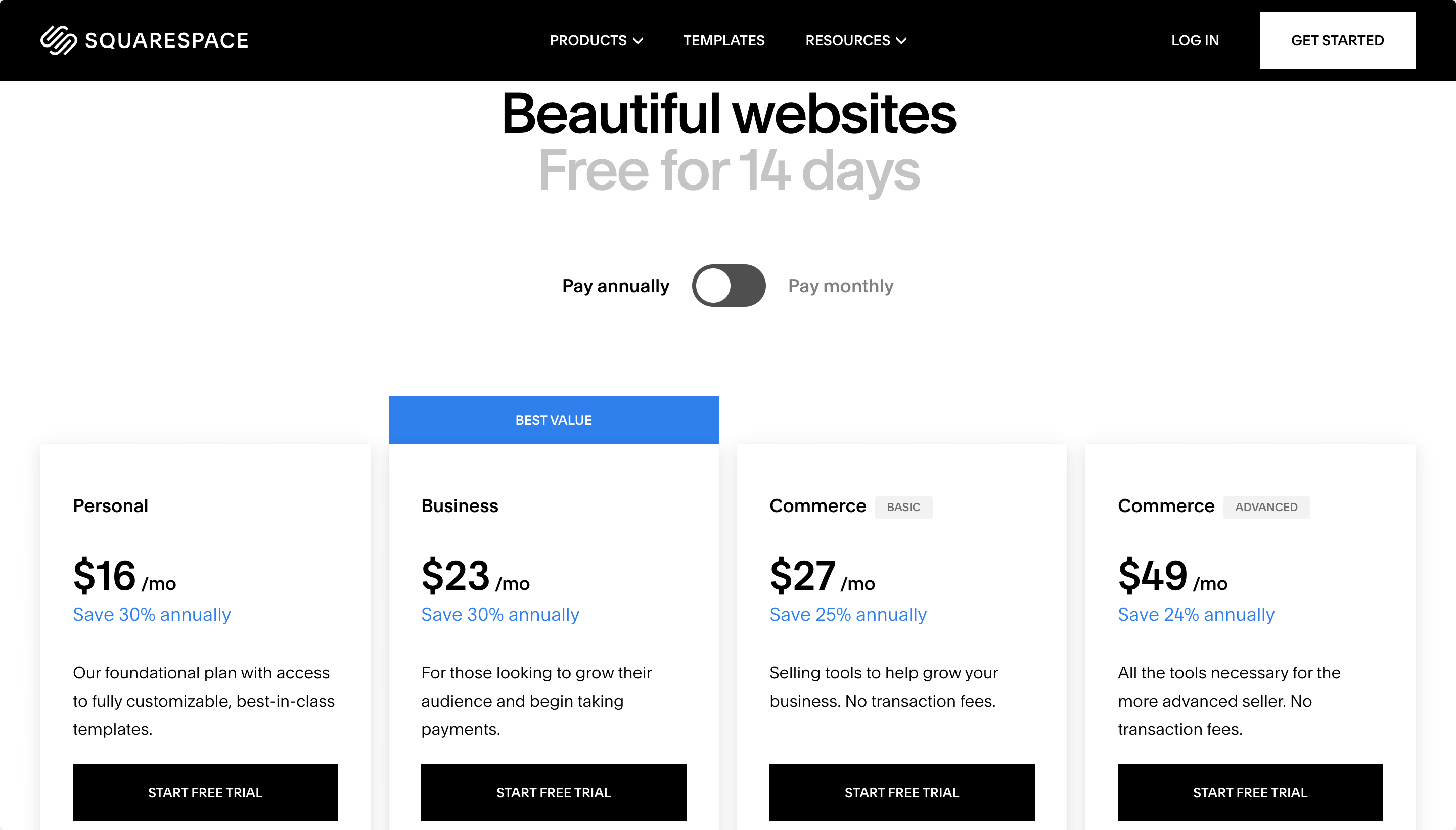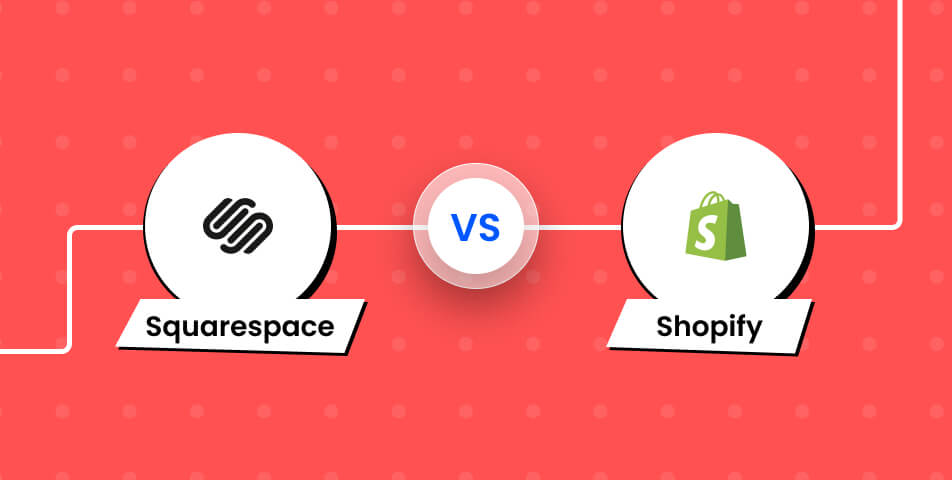Squarespace Vs Shopify, when it comes to launching an e-commerce website, there are numerous factors to consider. One of the most important decisions is choosing the right platform to build your site on.
In this article, we’ll be comparing two popular choices:
Squarespace and Shopify. In order to help you make an informed decision on which platform is right for your business, we’ll take a deep dive into the key features, pricing, and ease of use for each platform.
Key Takeaway :
In conclusion, both Squarespace and Shopify offer powerful e-commerce capabilities, so the choice between the two ultimately comes down to what features and pricing plans suit your business best. Squarespace may be the best choice for smaller businesses and individuals, offering simplicity, sleek design, and customizable templates, while Shopify may be the better option for those in need of advanced e-commerce features, more payment options, and a greater range of third-party integrations.
Understanding Squarespace and Shopify
What is Squarespace?
Squarespace is a website builder that offers a range of website design options, including e-commerce capabilities. It’s known for its sleek design templates and user-friendly interface. Squarespace is a great option for small businesses or individuals who want a simple and intuitive website builder that integrates e-commerce functionality.

One of the key benefits of Squarespace is its drag-and-drop interface, which allows users to easily customize their website’s design without any coding knowledge.
Squarespace also offers a variety of built-in features, such as SEO optimization and mobile responsiveness, that can help businesses improve their online presence.
Additionally, Squarespace offers a range of pricing plans, from a basic personal plan to advanced business plans with more features and functionality.
This makes Squarespace a flexible option for businesses of all sizes and budgets.
What is Shopify?
Shopify is an all-in-one e-commerce platform that provides entrepreneurs and businesses with everything they need to create an online store.

Shopify is known for its robust e-commerce features, its range of integrations, and its easy-to-use interface. Shopify is best suited for businesses looking to scale their e-commerce operations quickly.
One of the key benefits of Shopify is its extensive app store, which offers a range of third-party integrations that can help businesses streamline their operations and improve their online sales.
Shopify also offers a range of built-in features, such as payment processing and shipping management, that can help businesses manage their online store more efficiently.
Additionally, Shopify offers a range of pricing plans, from a basic plan for small businesses to advanced plans for larger businesses with more complex needs.
This makes Shopify a flexible option for businesses of all sizes and budgets.
Overall, both Squarespace and Shopify offer powerful website-building and e-commerce capabilities.
Which platform is best for your business will depend on your specific needs and goals.
Squarespace is a great option for businesses looking for a simple and intuitive website builder, while Shopify is ideal for businesses looking to scale their e-commerce operations quickly.
Key Features Comparison of Squarespace vs Shopify
In today’s digital age, having a website is essential for any business. When it comes to building an e-commerce website, two popular platforms are Squarespace and Shopify. Here is a point-wise comparison of their key features:
Squarespace:
- Ease of Use: Squarespace offers a user-friendly interface with drag-and-drop functionality, making it easy for beginners to build and customize their websites.
- Design Templates: It provides a wide range of professionally designed templates, allowing you to create a visually appealing website.
- All-in-One Solution: Squarespace offers built-in features like hosting, domain registration, and a content management system (CMS), eliminating the need for additional third-party integrations.
- Blogging Capabilities: It includes a robust blogging platform, making it suitable for businesses that prioritize content marketing.
- Design Control: Squarespace provides extensive design control, allowing you to customize various aspects of your website’s appearance.
Shopify:
- E-commerce Focus: Shopify is specifically designed for e-commerce businesses, offering a comprehensive set of features for selling products online.
- Product Management: It provides advanced product management tools, allowing you to easily add, organize, and update your products.
- Payment Options: Shopify integrates with numerous payment gateways, giving your customers a variety of payment options.
- App Store: It has a vast app store with numerous plugins and extensions, allowing you to extend the functionality of your online store.
- Mobile Optimization: Shopify ensures that your website is optimized for mobile devices, providing a seamless shopping experience for mobile users.
Both Squarespace and Shopify have their own strengths and cater to different needs.
Squarespace is suitable for businesses looking for an all-in-one solution with a focus on design and content, while Shopify is ideal for businesses primarily focused on selling products online with advanced e-commerce features. Consider your specific requirements and priorities when choosing between the two.
E-commerce Capabilities
E-commerce capabilities are a crucial factor to consider when choosing a website builder for your online store. Both Squarespace and Shopify offer an impressive set of e-commerce features. Squarespace includes essential features such as product listings, inventory management, and order fulfilment.
Shopify, on the other hand, offers a more extensive range of e-commerce features, including abandoned cart recovery, gift cards, and customer profiles. Shopify is the clear winner in terms of e-commerce features, providing a more comprehensive set of tools to help you manage your online store.
Design and Customization
The design and customization of your website are critical to your brand’s success. Squarespace is well-known for its high-quality, customizable templates. With Squarespace, you can design a beautiful, professional-looking website quickly and easily, without needing any coding skills.
Shopify also offers a range of customizable templates, but they may not be as visually appealing as Squarespace’s templates. However, Shopify does provide more options for customizing your website’s CSS and HTML code, giving developers more flexibility. Therefore, if you have coding skills, Shopify might be the better option for you.
Payment Processing Options
Payment processing is another crucial factor to consider when choosing an e-commerce platform. Squarespace and Shopify both offer payment processing options, but Shopify provides a more extensive range of payment gateways.
Shopify supports over 100 payment gateways, whereas Squarespace only supports a limited number. If you need to use a specific payment gateway, Shopify may be the better option for your business.
Marketing and SEO Tools
Marketing and SEO are essential for driving traffic and sales to your online store. Shopify offers a range of built-in marketing tools, including an email marketing platform, discount codes, and abandoned cart recovery.
Squarespace also offers marketing features, but they are not as extensive as Shopify’s ones. In terms of SEO, both platforms are SEO-friendly and provide tools to help you optimize your website for search engines. However, Shopify provides more advanced SEO tools, making it easier for you to improve your website’s search engine ranking and attract more customers.
Third-Party Integrations
Integrations with third-party apps and services can help streamline your business operations and improve your website’s functionality. Both Squarespace and Shopify offer integrations with a variety of third-party apps and services.
However, Shopify has a larger number of integrations than Squarespace, providing access to a wider range of apps and services. Integrations with apps such as Google Shopping, Amazon, and eBay make Shopify able to sell into the biggest online marketplaces, while Squarespace’s integrations may better suit the needs of creative professionals and artists.
In conclusion, both Squarespace and Shopify are excellent website builders for e-commerce businesses. However, the choice between the two depends on your specific business needs. If you want a platform with more e-commerce features and payment processing options, Shopify may be the better option.
If you value design and customization, Squarespace may be the better choice. Ultimately, it is up to you to decide which website builder suits your business needs best.
Pricing and Plans of Squarespace and Shopify
When it comes to building an online store, choosing the right platform is crucial. Squarespace and Shopify are two of the most popular e-commerce platforms on the market. Both platforms offer a range of features to help you build and launch your online store.
However, one of the most important factors to consider when choosing a platform is pricing.
Squarespace Pricing
Sure! Here’s the information about Squarespace’s pricing plans converted into point-wise content:
Squarespace offers four pricing plans:

- Personal Plan ($16 per month):
- Ideal for small businesses starting out.
- Includes a custom domain, SSL security, and 24/7 customer support.
- Business Plan ($26 per month):
- Designed for growing businesses.
- Includes all features of the Personal plan.
- Additional features: professional email from Google, the ability to sell unlimited products.
- Basic Commerce Plan ($30 per month):
- Perfect for businesses that want to sell online.
- Includes all features of the Business plan.
- Additional features: abandoned cart recovery, and the ability to sell gift cards.
- Advanced Commerce Plan ($46 per month):
- Designed for high-volume businesses.
- Includes all features of the Basic Commerce plan.
- Additional advanced features: subscriptions, and advanced shipping options.
Additional e-commerce-specific plan:
- E-commerce Business Plan ($30 per month):
- Ideal for businesses that want to sell online.
- Includes additional e-commerce features.
- Suited for businesses that don’t require all the features of the Basic Commerce plan.
These pricing plans provide different levels of functionality and cater to the needs of various businesses. Consider your requirements and budget when selecting the most suitable plan for your e-commerce business.
Shopify Pricing
Shopify offers three pricing tiers:

Basic Shopify Plan ($29 per month):
- Designed for new businesses.
- Includes features such as unlimited products and 24/7 customer support.
Shopify Plan ($79 per month):
- Ideal for growing businesses.
- Includes all features of the Basic Shopify plan.
- Additional features: gift cards, and professional reports.
Advanced Shopify Plan ($299 per month):
- Designed for high-volume businesses.
- Includes all features of the Shopify plan.
- Additional advanced features: third-party calculated shipping rates, advanced report building.
Additional options:
- 90-day free trial available.
- Shopify Lite ($9 per month): Ideal for selling on platforms like Facebook and Instagram.
These pricing plans cater to businesses of different sizes and requirements. Choose the plan that aligns with your business needs and budget.
Additional Costs to Consider
- Squarespace: Charges a 3% transaction fee on all sales with its e-commerce plan, which can be waived when using Squarespace payments.
- Shopify: Charges a transaction fee of 2.9%, which can be reduced to 2.6% + 30 cents per transaction with Shopify Payments. Additional costs may occur with third-party apps and services.
Ease of Use
Squarespace User Experience
- Known for its intuitive, no-coding-required interface.
- Offers drag-and-drop tools for easy content management.
- E-commerce capabilities with built-in tools for creating an online store.
- Seamless integration with popular payment gateways.
Shopify User Experience
- User-friendly interface designed specifically for e-commerce.
- Easy management of orders, inventory tracking, and other essential tasks.
- Allows quick store launch with options to customize and scale as needed.
- Wide range of third-party integrations for added functionality.
In conclusion, both Squarespace and Shopify offer user-friendly experiences and tools for creating and managing an online presence, catering to various needs from bloggers to small business owners.
Final Thoughts
Choosing the right e-commerce platform is a crucial decision for any business owner. There’s no one-size-fits-all solution, so it ultimately comes down to what features and pricing plans suit your business best.
When it comes to simplicity, sleek design, and customizable templates, Squarespace may be the best choice for smaller businesses and individuals. However, if you need advanced e-commerce features, more payment options, and a greater range of third-party integrations, Shopify may be the better choice.
Ultimately, it’s up to you to determine which platform will help your e-commerce business grow. Both Squarespace and Shopify offer powerful e-commerce capabilities, so it’s simply up to you to find the one that best fits the needs of your business.


